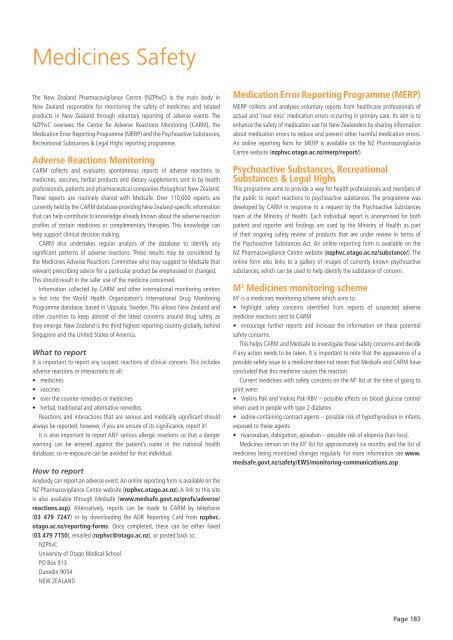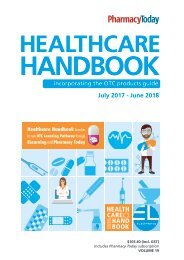2017 HCHB_digital
You also want an ePaper? Increase the reach of your titles
YUMPU automatically turns print PDFs into web optimized ePapers that Google loves.
Medicines Safety<br />
The New Zealand Pharmacovigilance Centre (NZPhvC) is the main body in<br />
New Zealand responsible for monitoring the safety of medicines and related<br />
products in New Zealand through voluntary reporting of adverse events. The<br />
NZPhvC oversees the Centre for Adverse Reactions Monitoring (CARM), the<br />
Medication Error Reporting Programme (MERP) and the Psychoactive Substances,<br />
Recreational Substances & Legal Highs reporting programme.<br />
Adverse Reactions Monitoring<br />
CARM collects and evaluates spontaneous reports of adverse reactions to<br />
medicines, vaccines, herbal products and dietary supplements sent in by health<br />
professionals, patients and pharmaceutical companies throughout New Zealand.<br />
These reports are routinely shared with Medsafe. Over 110,000 reports are<br />
currently held by the CARM database providing New Zealand-specific information<br />
that can help contribute to knowledge already known about the adverse reaction<br />
profiles of certain medicines or complementary therapies. This knowledge can<br />
help support clinical decision making.<br />
CARM also undertakes regular analysis of the database to identify any<br />
significant patterns of adverse reactions. These results may be considered by<br />
the Medicines Adverse Reactions Committee who may suggest to Medsafe that<br />
relevant prescribing advice for a particular product be emphasised or changed.<br />
This should result in the safer use of the medicine concerned.<br />
Information collected by CARM and other international monitoring centres<br />
is fed into the World Health Organization’s International Drug Monitoring<br />
Programme database, based in Uppsala, Sweden. This allows New Zealand and<br />
other countries to keep abreast of the latest concerns around drug safety as<br />
they emerge. New Zealand is the third highest reporting country globally, behind<br />
Singapore and the United States of America.<br />
What to report<br />
It is important to report any suspect reactions of clinical concern. This includes<br />
adverse reactions or interactions to all:<br />
••<br />
medicines<br />
••<br />
vaccines<br />
••<br />
over the counter remedies or medicines<br />
••<br />
herbal, traditional and alternative remedies.<br />
Reactions and interactions that are serious and medically significant should<br />
always be reported; however, if you are unsure of its significance, report it!<br />
It is also important to report ANY serious allergic reactions so that a danger<br />
warning can be entered against the patient’s name in the national health<br />
database, so re-exposure can be avoided for that individual.<br />
How to report<br />
Anybody can report an adverse event. An online reporting form is available on the<br />
NZ Pharmacovigilance Centre website (nzphvc.otago.ac.nz). A link to this site<br />
is also available through Medsafe (www.medsafe.govt.nz/profs/adverse/<br />
reactions.asp). Alternatively, reports can be made to CARM by telephone<br />
(03 479 7247) or by downloading the ADR Reporting Card from nzphvc.<br />
otago.ac.nz/reporting-forms. Once completed, these can be either faxed<br />
(03 479 7150), emailed (nzphvc@otago.ac.nz), or posted back to:<br />
NZPhvC<br />
University of Otago Medical School<br />
PO Box 913<br />
Dunedin 9054<br />
NEW ZEALAND<br />
Medication Error Reporting Programme (MERP)<br />
MERP collects and analyses voluntary reports from healthcare professionals of<br />
actual and ‘near miss’ medication errors occurring in primary care. Its aim is to<br />
enhance the safety of medication use for New Zealanders by sharing information<br />
about medication errors to reduce and prevent other harmful medication errors.<br />
An online reporting form for MERP is available on the NZ Pharmacovigilance<br />
Centre website (nzphvc.otago.ac.nz/merp/report/).<br />
Psychoactive Substances, Recreational<br />
Substances & Legal Highs<br />
This programme aims to provide a way for health professionals and members of<br />
the public to report reactions to psychoactive substances. The programme was<br />
developed by CARM in response to a request by the Psychoactive Substances<br />
team at the Ministry of Health. Each individual report is anonymised for both<br />
patient and reporter and findings are used by the Ministry of Health as part<br />
of their ongoing safety review of products that are under review in terms of<br />
the Psychoactive Substances Act. An online reporting form is available on the<br />
NZ Pharmacovigilance Centre website (nzphvc.otago.ac.nz/substance/). The<br />
online form also links to a gallery of images of currently known psychoactive<br />
substances, which can be used to help identify the substance of concern.<br />
M 2 Medicines monitoring scheme<br />
M 2 is a medicines monitoring scheme which aims to:<br />
• • highlight safety concerns identified from reports of suspected adverse<br />
medicine reactions sent to CARM<br />
• • encourage further reports and increase the information on these potential<br />
safety concerns.<br />
This helps CARM and Medsafe to investigate these safety concerns and decide<br />
if any action needs to be taken. It is important to note that the appearance of a<br />
possible safety issue to a medicine does not mean that Medsafe and CARM have<br />
concluded that this medicine causes the reaction.<br />
Current medicines with safety concerns on the M 2 list at the time of going to<br />
print were:<br />
• • Viekira Pak and Viekira Pak-RBV – possible effects on blood glucose control<br />
when used in people with type 2 diabetes<br />
• • iodine-containing contrast agents – possible risk of hypothyroidism in infants<br />
exposed to these agents<br />
• • rivaroxaban, dabigatran, apixaban – possible risk of alopecia (hair loss).<br />
Medicines remain on the M 2 list for approximately six months and the list of<br />
medicines being monitored changes regularly. For more information see www.<br />
medsafe.govt.nz/safety/EWS/monitoring-communications.asp<br />
Page 183



